2019
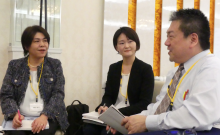
“Promoting Successful Local Case Models of Health System Management for Dementia”
On March 13, 2019, the WHO Kobe Centre (WKC), in collaboration with Kanagawa Prefecture, Japan, hosted the “WHO Workshop: Translating Scientific Evidence into Policy—Facilitating the Mechanisms for Promoting Successful Local Case Models of Health System Management for Dementia.”
The meeting convened policy-makers, healthcare professionals, academia, as well as civil society. Participants travelled from all corners of Japan to represent some of the country’s most innovative municipalities in community-based practices for dementia-related initiatives.
Following presentations and a vibrant group discussion, participants reached a consensus to promote evidence-based, citizen-led approaches. The WKC will collaborate with Japan’s leading municipalities and researchers to serve as a catalyst and disseminate best practices.

WKC Research Contributes to UK Government Enquiry on Funding Challenges for Sustainable Long-Term Care in England
The UK House of Lords Select Committee on Social Care Funding in England has called upon Dr Jonathan Cylus of WHO’s European Observatory on Health Systems and Policies to provide evidence and review the implications of potential revenue raising mechanisms to fund social care in England. WKC funded research was prominently featured in the discussion on the stability and sustainability of different funding mechanisms.
Please follow this link for more details: http://data.parliament.uk/writtenevidence/committeeevidence.svc/evidencedocument/economic-affairs-committee/social-care-funding-in-england/written/98567.html
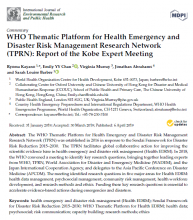
New publication: the Kobe Expert Meeting on Health Emergency and Disaster Risk Management
A new publication sharing the results of the Kobe Expert Meeting on health emergency and disaster risk management (Health EDRM) was published in the International Journal of Environmental Research and Public Health. The meeting convened members of the WHO Thematic Platform for Health Emergency and Disaster Risk Management Research Network. The meeting identified research questions in five major areas for Health EDRM: health data management, psychosocial management, community risk management, health workforce development, and research methods and ethics. Funding these key research questions is essential to accelerate evidence-based actions during emergencies and disasters.
Article available at https://www.mdpi.com/1660-4601/16/7/1232
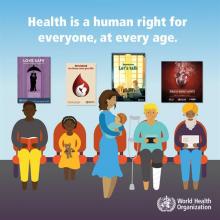
World Health Day 2019 - Message of Dr Sarah Barber, Director of the WHO Centre for Health Development
World Health Day on 7 April is a chance for people around the world to celebrate health. This year focuses on universal health coverage (UHC) and primary healthcare, the cornerstones of health for all – everyone, everywhere. It is a chance to highlight WHO’s goal of a fairer, healthier world in which no one is left behind.
UHC means that all people have access to the quality health services they need, when and where they need it, without financial hardship. Making the right to health a reality is one of WHO’s primary goals. WHO is committed to ensuring that by 2024, one billion more people will benefit from access to services that address the most significant causes of disease and death. The quality of these services must be good enough to improve the health of people who receive them. The cost of services must not push people into poverty and destroy their futures and perhaps those of their children.
Primary health care is the foundation of universal health coverage. It is an approach that embraces all of society for better health and wellbeing, centred on the needs and preferences of individuals, families and communities. It focuses on the essential package of care needed for physical, mental and social health and wellbeing, from promotion of health and prevention of disease and ill health, to treatment, rehabilitation and end-of-life care, in accessible settings where people live or work.
UHC and primary health care recognise that health is a fundamental human right. They put people at the centre, and empower individuals, families and communities with knowledge and care to optimize their health. This requires stakeholders to work together across sectors to address the social, economic, environmental and commercial factors that influence health and wellbeing (the determinants of health). A health system strengthened through UHC and primary health care is resilient and copes better with natural disasters and emergencies.
Japan’s experiences in UHC and primary health care hold many lessons for other countries. From the 1950s to 1970s, Japan invested in controlling communicable diseases and preventing non-communicable diseases. In 1961, the country demonstrated its commitment to equity and access to healthcare by instituting a comprehensive health insurance programme. Japan also understood that involving sectors beyond health were critical for improving health outcomes. These investments have paid off, greatly contributing to the country’s economic vitality today.
Now, Japan has the highest life expectancy in the world at 83.7 years. The number of cases of impoverishment due to health spending is very low, ranging from 0.5 – 1.4%. Japan today enjoys good health outcomes, and people are living active, healthy lives at older ages than anywhere else in the world.
But beyond Japan, much more needs to be done. In the South-East Asia region, around 800 million people do not have full coverage of essential services. At least 65 million people are pushed into poverty because of health spending, mainly on medicines. Over 18 million additional health workers are needed by 2030 to meet the global targets of the Sustainable Development Goals and UHC.
The WHO’s Centre for Development is strategically placed in Kobe to conduct research for health systems of the future accelerate progress towards UHC. We work with researchers across the globe to explore best practices and how they can help other countries achieve UHC. Our work focuses on innovative solutions that strengthen health and the delivery of healthcare solutions, especially for rapidly ageing populations.
We are committed to translating these research findings into practice, to stimulate policies and galvanize action to achieve UHC and the Sustainable Development Goals. We are determined that our research on health development will contribute to making universal health care a reality for everyone. We are dedicated to health for all, for everyone, everywhere.
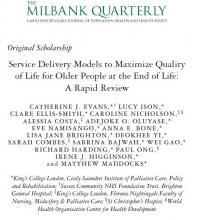
New Publication by WKC in The Milbank Quarterly
WKC in collaboration with the Cicely Saunders Institute for Palliative Care, Policy and Rehabilitation, King’s College London, are pleased to announce that our paper ‘Service Delivery Models to Maximize Quality of Life for Older People at the End of Life: A Rapid Review’ has been published in the current edition (March 2019) of The Milbank Quarterly. The paper, which is open access, can be accessed at: https://onlinelibrary.wiley.com/doi/full/10.1111/1468-0009.12373.
The WHO web page which carries the full report of the study and project details can be accessed at: https://extranet.who.int/kobe_centre/en/project-details/service-delivery-models-maximise-quality-life-older-people-end-life-rapid-review
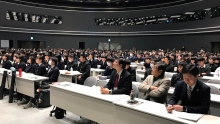
"To achieve Sustainable Development Goals" High School Students discuss global agendas
On February 11 2019, the WHO Kobe Centre, along with the Hyogo Prefectural Board of Education and Osaka University, organized the WKC forum “Think Global Agenda with High School Students” at the Kobe Fashion Mart Hall. About 500 students and teachers participated, mainly from high schools in Hyogo prefecture, and shared their views of how we can contribute to achieve Sustainable Development Goals.
In the keynote speech entitled, “No one left behind, from MDGs to SDGs ”, Prof Eisei Kurimoto, Vice President of Osaka University explained the world trends changed in the duration of MDGs and future challenges in the duration of SDGs. He said, ” Is the concept of being left behind really correct? Sometimes it becomes a line of sight from the top. I have seen plenty of problems in Africa that arise between development and keeping of old-fashioned living. It is true that the United Nations is the main key player for the achievement of SDGs, but the UN is sometimes ineffective. It is important that all stakeholders move forward one by one in complex values and problems.”
In the following panel discussion, four high school students took the podium. First, Mr. So Fujiwara, a third-year student at Ono High School said, "I think to introduce PC based self-learning tools is one of the solution for the education in rural area in low income countries”. Mr Yuzuki Kume, a second-year student at Kawanishi Midoridai High School said, "To stop global warming, we need to consider how to reduce current existing CO2, for example, by using technology of artificial photosynthesis, in addition to consider how to prevent to produce more CO2.” Next, Mr Tatsuya Shimoyama, a second-year student at Takarazuka Kita High School year said, "We need to consider more on waste management system to shift from incineration to recycle. We can learn from good models in Sweden.”
Finally, Mr Yuya Murao, a second-year student at Toyooka High School, said, " As a one of the measure to revitalize the local economy, I propose to introduce a banknote that is decreasing in value, issued in the region, to improve the motivation of people who buy local products.”
In the following Q&A session, opinions and questions on the ideas of the panelists were raised, and active discussions were developed.
In the afternoon, 100 oral and poster sessions by the students from Hyogo, Osaka, Wakayama, Tokushima and Kochi prefecture were given.
At the closing, Dr Sarah Louise Barber, Director of WHO Centre for Health Development (WHO Kobe Centre) congratulated successful completion of WKC Forum and encouraged the students to be responsible for the next generation and to keep contribute to achieve SDGs.
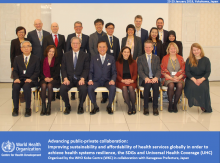
A Meeting on “Price setting and price regulation in health care” was held in Yokohama, Kanagawa Prefecture, Japan
A joint WHO/OECD study is underway about health care pricing and its impact on access, quality, and health outcomes. Pricing health services is a key component in purchasing the benefits package (the covered services) within the overall financing system of health systems. To discuss this study and share the knowledge and outcomes from 9 country case studies, a meeting was held in Yokohama City, Kanagawa Prefecture, Japan from 23 to 25 January 2019. This was organized by the WHO Centre for health Development (WHO Kobe Centre) and Kanagawa Prefecture Government, with the Organization for Economic Cooperation and Development (OECD) as a partner.
The meeting brought together key researchers and policy-makers in the area, from a wide range of international institutions, within policy, international development and academia, to work alongside OECD and WHO experts from EURO (WHO European Regional Office) and WPRO (WHO Western Pacific Regional Office).
The case studies were undertaken in a range of middle- and high-income countries representing a range of health care systems, experiences in purchasing and price setting, and the commitment to improve on existing financing mechanisms to attain broader policy goals. The meeting recognized that no single model is applicable to all settings, and worked to identify best practices and areas for future research to support countries, particularly in low- and middle-income settings. A full report of findings will be published in June 2019.
Mr Yuji Kuroiwa, the Governor of Kanagawa prefecture, declared his support for and strong commitment to innovative health care policies which are responsive to a super-aged society. He also warmly welcomed delegates representing the 9 countries, OECD and WHO. “I hope that through this workshop, participants will become well-informed about Kanagawa’s innovative health care policy and establish networks for future collaborations between Kanagawa, Japan and other countries,” Governor Kuroiwa said.
The WHO Kobe Centre (WKC) launches a monograph on knowledge translation for healthy ageing
The WKC is pleased to announce the launch of a monograph, Advancing universal health coverage through knowledge translation for healthy ageing: lessons learnt from the Japan Gerontological Evaluation Study, by the National Center for Geriatrics and Gerontology in Japan.
The monograph about JAGES sheds light about how research can be translated into programs and practice.
For more details, please visit the JAGES project page.

